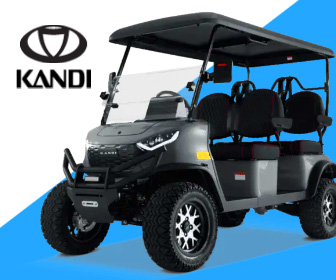About Kandi America Manufacturing Company
Kandi America: A Budget-Friendly EV Contender
Kandi America, a subsidiary of China's Kandi Technologies, has been shaking up the U.S. EV scene with its lineup of cost-effective electric vehicles, golf carts, and UTVs. Headquartered in Dallas, Texas, it entered the U.S. market in 2020, targeting affordability with compact EVs like the K27 and K23. Unlike big-name automakers, Kandi focuses on practical, short-range electric mobility, making EV ownership accessible to a broader audience.
Kandi’s Compact EVs: K27 & K23
Kandi America first gained attention with the K27, which was marketed as the cheapest EV in the U.S., priced around $12,000 after incentives. It’s a compact, low-speed vehicle that tops out at 25-35 mph (40-56 km/h), making it ideal for urban commuting or gated communities.
- Kandi K27: 17.7 kWh battery, ~59-mile (95 km) range
- Kandi K23: 41.4 kWh battery, ~111-mile (178 km) range
While these specs won’t impress Tesla fans, they meet the needs of buyers looking for a basic, eco-friendly alternative for short trips. However, both models lack cutting-edge features seen in rival brands.
Electric Golf Carts: Leisure Meets Utility
Beyond traditional EVs, Kandi America has built a strong reputation for electric golf carts. Its Kruiser lineup includes 4- and 6-passenger models with:
- 5,000-watt motors for solid acceleration
- 40-mile (64 km) range per charge
- Lithium battery options for longer life
These carts cater to both recreational users and businesses, offering a blend of functionality and fun. The company even partnered with Lowe’s for NFL-themed carts, adding a splash of customization to its lineup.
NEVs & Off-Road Vehicles: A Niche Market
Kandi also taps into the neighborhood electric vehicle (NEV) market, where low-speed EVs thrive. The Cowboy e10K NEV offers a practical solution for short-distance commuting, while the Trail King e1500 mini bike provides off-road fun. These models bridge the gap between golf carts and traditional cars, appealing to suburban and rural buyers.
Dealer Network vs. Direct Sales: A Double-Edged Sword
Unlike Tesla, Kandi America relies on third-party dealers rather than direct-to-consumer sales. This approach allows for a wider reach but also leads to inconsistencies in:
- Pricing and availability
- Customer service quality
- Warranty support
The company planned to open a North American manufacturing plant, but as of March 2025, updates remain unclear, suggesting possible delays.
Financial Growth but Small Market Share
Kandi Technologies reported $123.6 million in revenue for 2023, marking its highest in three years. However, compared to mainstream EV brands, Kandi’s market share remains small. While affordability is a strong selling point, limited brand recognition and niche product focus have kept it from breaking into the mainstream.
Customer Experience: A Mixed Bag
Kandi America receives praise for its budget-friendly pricing and simple, functional designs, but customer feedback varies.
-
Pros:
- Affordable pricing
- Decent reliability for light use
- Strong battery performance in some models
-
Cons:
- Inconsistent dealer support
- Reports of slow warranty service
- Some complaints about delayed parts availability
Kandi offers a two-year limited warranty, but execution seems inconsistent. The Dallas office provides support, yet responsiveness remains a concern for some buyers.
Is Kandi America Right for You?
If you’re after a low-cost EV, a neighborhood electric vehicle, or a fun electric golf cart, Kandi America delivers options that are hard to beat on price. However, for those who value high-speed performance, advanced technology, or premium after-sales service, more established brands may still have the edge.
For budget-conscious buyers, Kandi America’s affordable EV lineup is worth a closer look—especially if you have strong dealer support in your area.
View all Products Produced by "Kandi America"
(where we publish the EV description and EV specs for each model)


